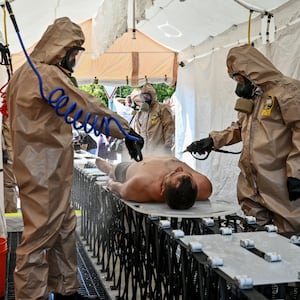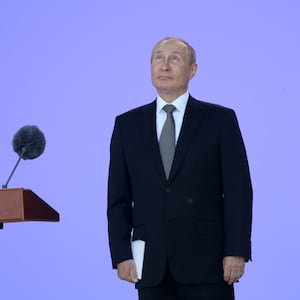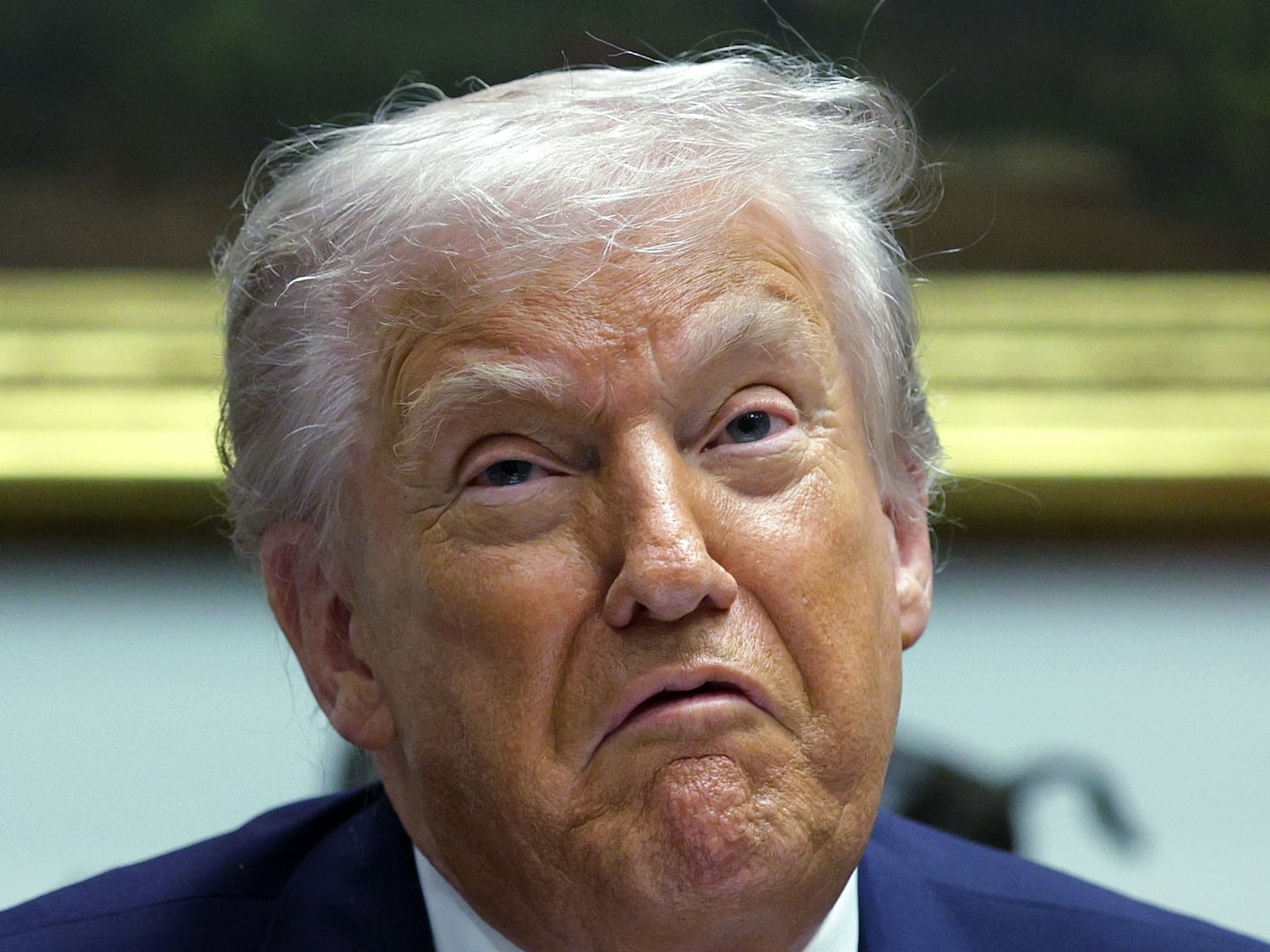Behind closed doors, a group of U.S. diplomats sat down to negotiate a crucial agreement about protecting Ukraine’s borders after the dissolution of the Soviet Union. Little did they know their efforts to seem direct and sincere in negotiations would devolve into a clouded message of seeming contradictions at the center of a war in Ukraine.
The plan was to finalize a deal in December of 1994 about all of the nuclear weapons Ukraine inherited after the breakup of the Soviet Union. Ukraine relinquished them on the condition that Russia, the United States, and the U.K. promise security “assurances” to protect the territorial integrity and borders of Ukraine through the so-called Budapest Memorandum.
Russia’s invasion and annexation of Crimea in 2014, not to mention Russia’s war on Ukraine this year, have already breached the agreement. And Ukrainian officials have even bristled at what they see as broken promises from the Biden administration.
Ukrainian President Volodymyr Zelensky threatened earlier this year if Ukraine didn’t receive the deal’s security guarantees, the whole agreement would be void, and has been railing against the agreement since.
“Sometimes it’s better to have nothing and know that you are alone with the enemy than to have a large circle of friends, partners who in fact will not protect you,” Zelensky said in April.
Fedir Venislavsky, President Zelensky’s representative to Ukraine's Constitutional Court, has chimed in, too.
“When Ukraine gave up its nuclear potential… Ukraine was confident the other countries who had signed all of those agreements were going to guarantee its territorial integrity,” Venislavsky said. “They signed their obligation to protect Ukraine, to provide the security and safety,” he said, but “did not perform.”
Some of the aggrieved response can trace its origins all the way back to 1994 and comes down to the very text itself, which has left things murky at best—with loads of wiggle room for disagreement.
The agreement is not legally binding, and the text doesn’t lay out specific obligations describing what security “assurances” are. And that’s by design.
The American diplomats showed up to the negotiations insisting the United States could not commit to protecting Ukrainian territorial sovereignty with security “guarantees”—which would rope the United States into military commitments akin to NATO guarantees. The United States could instead offer vague “assurances” it would respond to threats or attacks. All sides agreed, and signed off in December of 1994.

U.S. President Clinton, Russian President Yeltsin, and Ukrainian President Kravchuk after signing the Trilateral Statement in Moscow on Jan. 14, 1994.
Photo From William J. Clinton Presidential Library/Wikimedia CommonsBut a translation hiccup has left various interpretations of the text that might be inserting some doubt and bewilderment about obligations to Ukraine now, negotiators for the agreement told The Daily Beast.
The Russian and Ukrainian negotiators only provided the word “garantii” or “harantii” as a way to describe “guarantees” or “assurances,” but there was no explicit way to specify in Russian and Ukrainian which word the United States meant in the deal, according to Rose Gottemoeller, the former Deputy Secretary General of NATO and former U.S. under secretary of state for arms control and international security. And making sure the agreement only contained vague “assurances”—and not specific military commitments or “guarantees”—was the U.S. government’s goal.
“‘Garantii’ in Russian and Ukrainian is kind of the only word they had—they didn't have a word for ‘assurances,’” Gottemoeller, who served on the White House National Security Council as Director for Russia, Ukraine, and Eurasia Affairs at the time, told The Daily Beast. “The lawyers were there, the linguists were there, and we all agreed as we were preparing to sign this document that they were equal in meaning in three languages. So the English says ‘security assurances,’ and the Russian and Ukrainian versions say ‘garantii.’ They say ‘security guarantees.’”
The American negotiating team took several steps to try to ensure that there wasn’t going to be confusion one day, according to Steve Pifer, a former U.S. Ambassador to Ukraine who was also involved in the negotiations.
“I sat down with the heads of the Russian and Ukrainian delegations and said, ‘we need to put this on the record that when you see garantii in Russian, or harantii in Ukrainian it is understood in the English sense of the word assurance,’” Pifer told The Daily Beast.
But that context is gone now, Gottemoeller said.
“There was not any confusion that the United States was offering something different,” Gottemoeller told The Daily Beast. “And that point is being lost.”
The nuance has been missing for some time in Ukraine, and some of the confusion about America’s promises might come from Ukrainians’ own political efforts to rally support around the deal they brought home by amping it up to seem more substantial than it actually was.
“When Ukrainians, after Budapest, went back, they probably tried to sell it more as ‘guaranteed’ assurances, in part because there was a political interest in Ukraine in saying this is a bigger deal and sort of obscuring the limitation that we gave,” Pifer said.
And now, six months into Russia’s invasion into Ukraine, during which Russians have lobbed nuclear threats left and right, the Ukrainians are smarting, looking back and wishing they had made the agreement more ironclad and clear. Ukrainian officials are starting a campaign to draw up a new agreement that will build on the Budapest Memorandum—but this time with details, the Head of the Office of Ukraine’s President, Andriy Yermak, said in an interview in July. The U.K. and Poland have expressed interest so far, and Ukraine is pressuring the United States to join in, according to Yermak.
And this time, Ukraine wants ratification from the legislative branches of allies and “guarantees”—a pill that might be hard to swallow for the Biden administration.
“We are not interested in Budapest Memorandum number two. I think it will be a structure involving a large agreement with many participants, and then there will be additional bilateral, more detailed agreements with our partners,” Yermak told HB.
“Given the Budapest Memorandum experience… the future agreement should contain security guarantees, not assurances,” Yermak noted at the World Economic Forum in Davos.
When reached for comment, the White House and the State Department didn’t comment directly on whether the United States is in talks about a new version of the Budapest Memorandum with guarantees.
Attempts to criticize the United States’ assistance have appeared to simmer for now—the Biden administration has sent a whole host of security packages with key weaponry that has helped Ukraine defend against Russia, and the Biden administration has issued sanctions in an attempt to grind Moscow’s economy down. A State Department spokesperson defended the Biden administration’s approach, noting the administration has “reaffirmed” the Budapest commitments “repeatedly.”
But those foundational elements of the Budapest Memorandum—and confusion about what the United States’ obligations and promises are—remain and could reach a make-or-break moment in the coming weeks in the context of nuclear threats. In the absence of a new agreement, the existing deal on “assurances” could have a key role to play as Russian officials have been working to issue public declarations about when they could use nuclear weapons.
In the Budapest Memorandum, the United States committed to “provide assistance” to Ukraine “if Ukraine should become a victim of an act of aggression or an object of a threat of aggression in which nuclear weapons are used.”
U.S. officials have been warning for weeks that the war could take a dire turn as Russia works to run sham referenda in Ukrainian territories.
And although Russia’s Deputy Foreign Minister Sergey Ryabkov has insisted Russia would only use nuclear weapons in self-defense, concerns are growing that the Russians might try to claim “self-defense” to protect Ukrainian territory that Russia is seizing in Ukraine and bring nuclear weapons into the mix.
“The complexity here is that the Russians might use a nuclear weapon on the Ukrainian territory claiming [the] territory is now sovereign Russian territory and essentially they are defending their own territory by terrifying Ukrainians, in fact, in a way that might lead the Ukrainians to capitulate,” Gottemoeller said.
As far as nuclear threats and attacks go, the Biden administration hasn’t changed its nuclear posture. And for now, the National Security Council is breathing a sigh of relief at what it perceives to be Russia’s hesitation to use nuclear weapons full force.
“Russia itself has said many times that a nuclear war cannot be won and should never be fought,” National Security Council spokesperson Adrienne Watson told The Daily Beast.
It’s not a certainty that Russia will use nuclear weapons. But if it does, it could form a tricky test of the Biden administration’s resolve to protect Ukraine, particularly when the agreement isn’t crystal clear about what the United States ought to do, and when the Biden administration has been mostly mum on the deal.
The signals from the Biden administration aren’t helping—the Biden administration has largely shied away from citing the Budapest Memorandum as a justification for sending aid to Ukraine, which could raise questions about its commitment to the memorandum broadly. And that fuzzy approach ought to change, says Pifer.
The United States isn’t helping Ukraine just because it cares about democracy. It promised, when Ukraine relinquished its nuclear weapons, that it would help serve as a protector of Ukraine as part of a plan to get those nuclear weapons out of the picture.
“In the Budapest Memorandum we told the Ukrainians we would care. And that was an important piece in getting Ukraine to give up 1900 strategic nuclear weapons, weapons that had been designed, built, and deployed to strike the United States,” Pifer said.
Ukraine could probably do a better job of getting the United States to talk up the spirit of the agreement and follow through, said Mariana Budjeryn, a Senior Research Associate with the Project on Managing the Atom (MTA) at the Harvard Kennedy School’s Belfer Center.
“There isn’t an international adjudication body, there isn’t a court where you can contest this. It really is what you make of it,” Budjeryn told The Daily Beast.
Beyond just tensions about whether the United States is doing enough, doubts about how helpful the Budapest Memorandum has been could lead more nations to look favorably on nuclear proliferation, according to Budjeryn.
States that might be eyeing obtaining nuclear weapons one day might come away with the conclusion that not having nuclear weapons, even with security agreements with nuclear powers like the United States for protection, does little in actually deterring threats and attacks.
“They’re not going to sit around perusing letter by letter and theory by theory of what the Budapest Memorandum was and what it wasn’t. The public narrative in traditional public space is, there was Ukraine. It inherited nuclear weapons from the Soviet Union. It decided to give them up in return for these security assurances. And look what happened to it,” Budjeryn said. “When you have that kind of breach, I think it reverberates through the whole system.”
A senior administration official acknowledged that Russia might be increasing incentives for nuclear proliferation around the world. But the official told The Daily Beast the White House’s hope is that the global response to punish Russia for its invasion of a non-nuclear state sends potential proliferators a message that it doesn’t pay to attack others.
“We will continue to promote nonproliferation policy even as Russia’s actions in Ukraine may make the job harder,” the senior administration official told The Daily Beast. “The incredible costs being born by Russia as a result of its strategic mistake, both militarily as imposed by Ukrainian forces and economically due to the global response, should deter any nuclear armed state who chooses military aggression against a non-nuclear armed state.”








